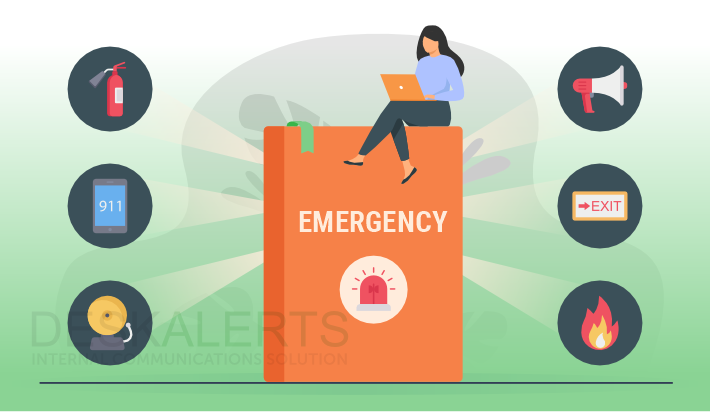
Safety on university campuses is crucial for the well-being and success of students, faculty, and staff. Ensuring safety creates an environment where all members feel secure to express themselves freely, engage in academic pursuits, and contribute to campus life.
Table of contents
Why educational institutions need to focus on safety
Common safety issues on campuses
The importance of communication for campus safety
DeskAlerts - the campus mass notification system you need
Why educational institutions need to focus on safety
- Universities are often open campuses with multiple entry points, making them vulnerable to security threats. Prioritizing safety measures such as security patrols, surveillance systems, and access control helps deter criminal activity and mitigate risks. By fostering a safe environment, universities can protect individuals from harm, including physical violence, theft, and harassment.
30 BEST SAFETY TIPS FOR 2024
- Safety is closely linked to academic performance and retention rates. Students who feel unsafe on campus may experience heightened stress and anxiety, impacting their ability to focus on their studies and engage in campus activities. By contrast, a safe campus promotes a sense of belonging and well-being, contributing to students' academic success and overall satisfaction with their college experience.
- Additionally, universities have a duty of care to their community members. Administrators have a responsibility to implement policies and procedures that prioritize safety and respond effectively to emergencies. This commitment not only protects individuals but also upholds the reputation and integrity of the institution.
Common safety issues on campuses
University campuses, while vibrant hubs of learning and community, also face various safety risks that require careful attention and mitigation strategies. Some of the most significant safety risks on university campuses include:
- Crime and violence: One of the primary safety concerns on campuses is crime, including theft, assault, and vandalism. Large campuses with open access points can be susceptible to criminal activity, necessitating robust security measures to deter and respond to incidents effectively.
- Sexual assault and harassment: Instances of sexual assault and harassment pose significant safety risks on university campuses. Addressing these issues requires comprehensive prevention programs, support services for survivors, and clear policies for reporting and adjudicating cases of sexual misconduct.
- Alcohol and drug abuse: Substance abuse, including alcohol and drug use, can lead to risky behavior, accidents, and health problems among students. Campuses must implement strategies to promote responsible drinking, provide support for substance abuse prevention and treatment, and enforce policies related to drug and alcohol use.
- Natural disasters and emergencies: Universities are vulnerable to natural disasters such as earthquakes, floods, and severe weather events, as well as emergencies like fires and power outages. Effective emergency preparedness plans, communication systems, and evacuation procedures are essential for ensuring the safety of campus residents during such events.
5 EMERGENCY MESSAGE TEMPLATES FOR CAMPUS
- Cybersecurity threats: With the increasing reliance on technology for academic and administrative purposes, cybersecurity threats such as data breaches, phishing attacks, and identity theft are significant concerns for universities. Protecting sensitive information, implementing robust cybersecurity protocols, and educating users about safe online practices are essential for safeguarding digital assets and privacy.
Addressing these campus emergency and safety risks requires a comprehensive approach involving collaboration among university administrators, faculty, staff, students, law enforcement agencies, and community partners. By identifying and mitigating these risks proactively, universities can create safer environments that support the well-being and success of their campus communities.

The importance of communication for campus safety
Effective communication is vital for safety on educational campuses as it ensures that all stakeholders are informed, prepared, and able to respond promptly to emergencies.
Clear communication channels facilitate the dissemination of critical information, including safety protocols, alerts, and updates. By keeping students, faculty, staff, and emergency responders informed and coordinated, communication enhances the effectiveness of response efforts, minimizes confusion and panic, and promotes a cohesive and resilient campus community.
COMMUNICATION IN EDUCATION
DeskAlerts - the campus mass notification system you need
DeskAlerts is a versatile communication software solution that can significantly enhance safety measures in schools and educational settings by providing an efficient and effective means of disseminating critical information to students, faculty, and staff.
The campus alert system contains a variety of tools and channels designed to cut through digital noise and deliver information in a way that can’t be ignored - making it the perfect choice for time-sensitive information needed to keep people safe.
Here's how the DeskAlerts college mass notification system can be utilized to improve safety on campuses:
- Emergency notifications: DeskAlerts enables instant dissemination of emergency notifications in case of threats like natural disasters, intruders, or other emergencies. Through pop-up alerts on computers, mobile devices, and digital displays, everyone can quickly receive essential instructions via the college mass notification system, such as evacuation routes or shelter-in-place procedures.
- Safety reminders: Regular safety reminders sent via our college mass notification system can help reinforce safety protocols and procedures. DeskAlerts can be used to send out reminders about fire drills, first aid training, or safety inspections, ensuring that everyone remains vigilant and prepared for emergencies.
- Customized alerts: With DeskAlerts, administrators can customize campus alerts based on specific safety concerns or geographical locations. For instance, alerts about an emergency can be tailored to specific campuses or faculty buildings, ensuring that recipients receive relevant information based on their location.
- Real-time communication: In crisis situations, real-time communication is crucial. DeskAlerts campus mass notification system provides a platform for instant two-way communication through its surveys and polls module, allowing recipients to acknowledge receipt of university alerts, request assistance, or provide updates on their status, facilitating better coordination and response during emergencies.
- Training and education: DeskAlerts college alerts can be used to deliver safety training materials, educational resources, and videos to students and staff. By promoting awareness and understanding of safety protocols, DeskAlerts helps empower individuals to respond effectively in the event of a campus emergency.
- Multi-channel delivery: DeskAlerts supports multi-channel delivery, ensuring that safety alerts reach recipients through various communication channels, including desktop computers, email, SMS, mobile apps, and digital signage. This maximizes the likelihood of message delivery, even in scenarios where one channel may be compromised.
- Post-incident communication: Following an emergency or crisis situation, DeskAlerts can be used to provide post-incident communication, including debriefings, counseling resources, and updates on recovery efforts, fostering a sense of community resilience and support.
***
Preparing your educational facility to respond effectively in a crisis situation is crucial. DeskAlerts campus safety software offers a comprehensive solution for improving safety in schools and educational environments by facilitating rapid communication, promoting awareness, and enabling proactive response measures. Get in touch with our team of experts today for a free demo of how our college mass notification system can improve campus safety in your organization.
FAQs
What is an academic alert
In an emergency context, an academic alert may refer to a notification system used by educational institutions to disseminate critical information and instructions to students and faculty during crises.
What are student alerts?
Student alerts are notifications sent by educational institutions via a campus mass notification system to students regarding various matters, including academic performance, upcoming deadlines, campus events, and emergency situations, aimed at keeping students informed and engaged in their educational experience.
What is an early alert in college?
In an emergency context, an early alert in college refers to notifications sent to students about urgent safety information.
What is considered an emergency in college?
Emergencies in college can include incidents such as natural disasters, fires, medical emergencies, hazardous material spills, violent threats, active shooter situations, and any other events posing immediate danger to students, faculty, or staff.
 Caroline Duncan
Caroline Duncan








